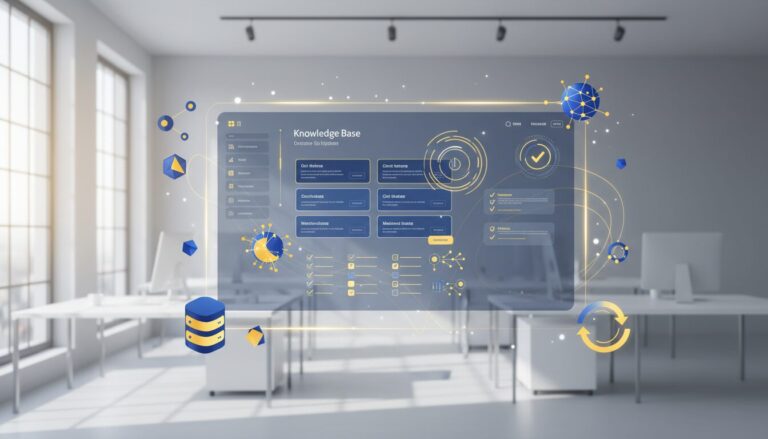Table of Contents
- Introduction to AI in Real Estate
- What is an AI App for Real Estate?
- Key Benefits of AI Apps in Real Estate
- Common Use Cases for AI in Real Estate
- Creating AI Apps for Real Estate: No-Code Solutions
- Implementation Guide: Building Your First Real Estate AI App
- Challenges and Considerations
- Future Trends of AI in Real Estate
- Conclusion
The real estate industry is undergoing a significant transformation, with artificial intelligence (AI) at the forefront of this change. Whether you’re a real estate agent, property manager, investor, or agency owner, understanding and leveraging AI applications can provide you with a competitive edge in today’s digital marketplace.
For many real estate professionals, the term “AI app” might sound complex and intimidating—conjuring images of complicated programming and technical expertise beyond their reach. However, the reality is quite different. Thanks to emerging no-code platforms, creating and implementing AI solutions tailored specifically for your real estate business is now accessible to everyone, regardless of technical background.
In this comprehensive guide, we’ll demystify AI applications for real estate, explore their practical benefits, examine real-world use cases, and show you how easy it can be to create your own custom AI tools without writing a single line of code. By the end of this article, you’ll understand not only what AI apps can do for your real estate business but also how to start building them yourself.
AI Applications in Real Estate
How artificial intelligence is transforming the real estate industry and how you can leverage it without any coding skills.
What is a Real Estate AI App?
Software that uses artificial intelligence to automate, enhance, and transform traditional real estate processes. Unlike conventional software, AI apps learn and improve over time as they process more data.
Key Benefits
- Time Efficiency – Automates repetitive tasks
- Enhanced Decisions – Data-backed insights
- 24/7 Availability – Always-on client service
- Scalability – Grow without proportional costs
Top Use Cases
- Intelligent Property Matching – Personalized recommendations
- Market Analysis – Predictive analytics and trends
- Virtual Assistants – 24/7 client engagement
- Document Processing – Automated paperwork handling
No-Code AI Revolution
Platforms like Estha have democratized AI technology, allowing real estate professionals to create custom applications without writing a single line of code.
Using intuitive drag-drop-link interfaces, you can build sophisticated AI tools in minutes rater than months.
No-Code Interface
Implementation Roadmap
Identify Business Need
Start small: focus on a specific pain point like lead qualification or neighborhood expertise.
Outline Knowledge & Workflow
Map out client questions, required information, and desired recommendations.
Build Using No-Code Platform
Use Estha’s drag-drop-link interface to create conversation flows and add your expertise.
Deploy & Integrate
Embed on your website, share via link, or integrate with existing communication channels.
Monitor & Improve
Analyze user interactions and continuously refine your AI app based on real usage.
Ready to Create Your Real Estate AI App?
Build personalized AI tools that reflect your unique expertise and brand voice—no coding skills required.
What is an AI App for Real Estate?
An AI app for real estate is a software application that uses artificial intelligence technologies to automate, enhance, or transform traditional real estate processes. These applications leverage various AI components—including machine learning algorithms, natural language processing, computer vision, and predictive analytics—to process large amounts of data, identify patterns, and deliver insights that would be difficult or impossible for humans to discover manually.
Unlike conventional software that follows static, pre-programmed rules, AI applications can learn from data over time, adapting and improving their performance as they process more information. This learning capability makes AI particularly valuable in the dynamic real estate market, where conditions, trends, and consumer preferences constantly evolve.
Real estate AI apps come in many forms, from specialized tools focused on singular functions (like automated property valuation) to comprehensive platforms that integrate multiple AI capabilities. They can operate as standalone applications, integrate with existing real estate software, or function as embedded components within websites and customer-facing platforms.
The most powerful aspect of modern AI apps for real estate is that they no longer require technical expertise to create or customize. With no-code AI platforms like Estha, real estate professionals can now build sophisticated AI tools tailored to their specific business needs through intuitive drag-and-drop interfaces—no programming knowledge required.
Key Benefits of AI Apps in Real Estate
Implementing AI applications in your real estate business delivers numerous advantages that can transform your operations and client experiences:
Time Efficiency and Automation: AI excels at handling repetitive tasks that traditionally consume hours of a real estate professional’s time. From answering common client inquiries to sorting through property listings and scheduling viewings, AI automation frees you to focus on high-value activities that require human judgment and relationship building.
Enhanced Decision Making: AI apps can process and analyze vast amounts of market data, transaction histories, and property information to provide evidence-based insights for better decision making. Whether you’re helping clients determine the right price for a property or identifying promising investment opportunities, AI tools deliver data-backed recommendations.
Improved Client Experiences: Today’s real estate clients expect personalized, responsive service available around the clock. AI applications can deliver 24/7 engagement through virtual assistants, personalized property recommendations, and interactive tools that keep clients informed and engaged throughout their real estate journey.
Competitive Differentiation: In a crowded real estate market, implementing innovative AI solutions helps you stand out from competitors. Custom AI apps that reflect your unique expertise and approach demonstrate your forward-thinking mindset and commitment to leveraging technology for better client outcomes.
Scalability Without Proportional Costs: Unlike hiring additional staff, AI applications can scale to handle increasing workloads without proportional cost increases. This scalability makes AI particularly valuable for growing real estate businesses looking to expand their reach without dramatically increasing overhead.
Data-Driven Market Insights: AI excels at identifying patterns and trends in market data that might escape human observation. These insights can help you anticipate market shifts, recognize emerging opportunities, and provide clients with valuable foresight about potential property value changes.
Common Use Cases for AI in Real Estate
AI applications are transforming virtually every aspect of the real estate industry. Here are some of the most impactful ways real estate professionals are leveraging AI technology:
Intelligent Property Matching
Traditional property searches rely on basic filters like location, price, and number of bedrooms. AI-powered property matching takes this to another level by understanding client preferences at a much deeper level. These systems can analyze hundreds of property attributes, including architectural styles, proximity to amenities, neighborhood characteristics, and even subtle features like natural light or views.
By learning from client interactions and feedback, these AI tools continuously refine their understanding of what each client truly values, resulting in highly personalized property recommendations that save time and increase client satisfaction. For real estate agents, this means spending less time sorting through listings and more time closing deals with genuinely interested buyers.
Market Analysis and Predictions
AI applications excel at processing vast datasets to identify market trends and make predictions about future property values. These tools can integrate traditional market indicators with non-traditional data sources—such as social media sentiment, economic indicators, development permits, and even transportation patterns—to forecast neighborhood growth potential and property appreciation.
For real estate investors and agents advising clients on long-term value, these AI-powered market intelligence tools provide a significant competitive advantage. They can identify emerging hot markets before they become widely recognized, spot properties with high appreciation potential, and help clients make more informed investment decisions based on comprehensive data analysis rather than intuition alone.
Virtual Assistants and Chatbots
AI-powered virtual assistants and chatbots have evolved from simple FAQ responders to sophisticated engagement tools that can qualify leads, schedule appointments, and provide detailed property information. These assistants can engage with potential clients 24/7, ensuring no inquiry goes unanswered regardless of when it arrives.
Advanced real estate chatbots can now conduct natural conversations, answer complex questions about properties or neighborhoods, and even guide clients through virtual property tours. They can collect valuable information about client preferences and requirements, creating detailed profiles that help agents provide more personalized service when human interaction does occur.
By handling initial inquiries and routing qualified leads appropriately, these AI assistants ensure real estate professionals spend their time with clients who are most likely to convert, significantly improving efficiency and conversion rates.
Automated Document Processing
Real estate transactions involve numerous documents—contracts, disclosure forms, loan applications, inspection reports, and more. AI-powered document processing tools can extract key information from these documents, verify completeness, flag potential issues, and even suggest appropriate next steps.
These systems use natural language processing to understand document content and machine learning to identify patterns that might indicate problems or opportunities. For real estate professionals, this means reduced paperwork burden, fewer errors, faster transaction processing, and the ability to handle more deals simultaneously without sacrificing attention to detail.
Some advanced AI document systems can even assist with contract generation, automatically populating templates with relevant property information and terms based on transaction parameters and client requirements.
Creating AI Apps for Real Estate: No-Code Solutions
Until recently, implementing AI solutions required either significant in-house technical expertise or substantial budgets to hire specialized developers. This technical barrier prevented many real estate professionals from leveraging AI despite recognizing its potential benefits.
Today, no-code AI platforms are democratizing access to artificial intelligence technology, allowing real estate professionals to create custom AI applications without writing a single line of code. These platforms provide intuitive visual interfaces where users can build sophisticated AI tools through simple drag-drop-link actions.
Estha stands at the forefront of this no-code AI revolution, making it possible for real estate professionals to build customized AI applications in minutes rather than months. Using Estha’s platform, you can create:
Property Recommendation Engines that learn from client preferences to suggest relevant listings based on both stated and unstated preferences.
Real Estate Expertise Chatbots that embody your specific knowledge about local markets, property types, or investment strategies—providing clients with instant access to your expertise even when you’re unavailable.
Interactive Property Valuation Tools that combine market data with your professional insights to deliver accurate, nuanced property valuations that go beyond algorithm-only approaches.
Client Qualification Systems that engage potential clients through conversational interfaces, gathering key information while simultaneously educating them about the market and your services.
The key advantage of platforms like Estha is that they allow you to infuse AI applications with your unique real estate expertise, local market knowledge, and brand voice. Rather than using generic AI tools, you can create custom applications that truly represent your specific value proposition and professional insights.
Implementation Guide: Building Your First Real Estate AI App
Creating your first AI application for real estate might seem daunting, but with no-code platforms, the process is surprisingly straightforward. Here’s a step-by-step approach to building your first real estate AI app using Estha:
Step 1: Identify a Specific Business Need
Start small and focused. Rather than trying to build a comprehensive AI solution, identify a single pain point or opportunity in your real estate business. Good candidates for your first AI app include:
– A lead qualification chatbot for your website
– A neighborhood expert advisor that answers questions about areas you serve
– A property investment analyzer that evaluates potential returns
– A first-time homebuyer guide that walks clients through the process
Step 2: Outline Your Knowledge and Workflow
Before building, map out the knowledge and process flow your AI app will need to incorporate. Consider:
– What questions will clients typically ask?
– What information do you need to collect from users?
– What recommendations or insights will you provide?
– How should the conversation or interaction flow?
This outline doesn’t need to be technical—it’s simply organizing your real estate expertise in a structured way.
Step 3: Build Using a No-Code Platform
With your outline prepared, create an account on Estha’s platform and use their intuitive interface to build your application. The process typically involves:
– Creating conversation flows or decision trees using the drag-drop-link interface
– Adding your professional knowledge and insights
– Customizing the user experience and visual elements
– Testing the application with sample scenarios
– Refining based on test results
Step 4: Deploy and Integrate
Once your AI app is built and tested, it’s time to make it available to clients. Estha allows you to:
– Embed the AI app directly on your real estate website
– Share it via a dedicated link
– Integrate it with your existing communication channels
Step 5: Monitor, Learn, and Improve
After deployment, pay attention to how clients interact with your AI app. Most no-code platforms provide analytics that show:
– Common questions or use patterns
– Points where users might get stuck
– Successful outcomes and conversions
Use these insights to continuously improve your AI application, adding new information and refining the user experience based on actual client interactions.
Remember, your first AI app doesn’t need to be perfect. The beauty of no-code platforms is that they allow for rapid iteration and improvement without technical hurdles. Start with something useful but manageable, then expand its capabilities as you become more comfortable with the technology.
Challenges and Considerations
While AI applications offer tremendous benefits for real estate professionals, implementing them successfully requires awareness of certain challenges and considerations:
Data Quality and Availability: AI systems are only as good as the data they learn from. In real estate, some markets may have limited historical data, or available data might not capture all relevant factors. When creating AI applications, be aware of data limitations and supplement algorithms with your professional judgment when necessary.
Client Comfort with Technology: While younger clients might readily embrace AI tools, others may prefer traditional human interaction. Design your AI implementation with flexibility, allowing clients to choose their preferred engagement method and ensuring human expertise remains accessible alongside AI capabilities.
Ethical Considerations: AI applications must be designed to avoid reinforcing biases or unfair practices in real estate. Be mindful of fair housing laws and ensure your AI tools don’t inadvertently discriminate or steer clients toward or away from certain neighborhoods based on protected characteristics.
Maintaining the Human Touch: Real estate remains a relationship-driven business. The most successful AI implementations enhance rather than replace human expertise and connection. Position AI tools as augmenting your service rather than substituting for personal attention.
Ongoing Maintenance: While no-code platforms significantly reduce technical barriers, successful AI applications still require regular updates to remain current with market changes, new property inventory, and evolving client needs. Plan for ongoing curation and refinement of your AI tools.
Future Trends of AI in Real Estate
The integration of AI in real estate is still in its early stages, with several emerging trends poised to further transform the industry:
Immersive Property Experiences: AI is enhancing virtual property tours through augmented and virtual reality, allowing potential buyers to visualize properties with personalized modifications. These technologies will increasingly blend with AI to create interactive experiences where clients can explore properties remotely while receiving intelligent insights about features and potential.
Predictive Maintenance and Property Management: For property managers and investors, AI systems that predict maintenance needs based on property characteristics, usage patterns, and environmental factors will become increasingly valuable. These systems will help optimize maintenance schedules, reduce unexpected repairs, and extend property lifespans.
Hyper-Personalized Market Intelligence: Future AI tools will deliver increasingly personalized market insights based on each client’s specific investment goals, risk tolerance, timeframe, and preferences. Rather than generic market reports, clients will receive tailored intelligence that directly informs their particular real estate decisions.
Integration of Blockchain and AI: The combination of blockchain technology and AI promises to streamline real estate transactions through smart contracts, automated verification processes, and secure, transparent record-keeping. This integration could dramatically reduce closing times and transaction costs.
Ambient Intelligence in Properties: AI-powered smart home systems are evolving toward ambient intelligence—environments that adapt to occupants’ preferences without explicit commands. This trend will influence both property features and how real estate professionals market and demonstrate properties to potential buyers.
Conclusion
AI applications are no longer futuristic concepts in real estate—they’re practical tools that forward-thinking professionals are already leveraging to deliver better client experiences, make more informed decisions, and gain competitive advantages. From intelligent property matching and market analysis to virtual assistants and automated document processing, AI is transforming every aspect of the real estate business.
The most significant recent development is the democratization of AI through no-code platforms like Estha, which remove technical barriers and make custom AI creation accessible to everyone in the industry. Real estate professionals can now build AI applications that embody their unique expertise and brand voice without writing code or hiring developers.
As you consider implementing AI in your real estate business, remember that successful adoption isn’t about replacing human expertise but augmenting it. The most powerful approach combines the efficiency, scalability, and data processing capabilities of AI with the empathy, judgment, and relationship-building skills that only humans can provide.
Whether you’re just starting to explore AI possibilities or ready to build your first custom application, the time to engage with this technology is now. The competitive advantage belongs to early adopters who learn to effectively blend artificial intelligence with their professional expertise to create exceptional value for their clients.
Ready to Create Your Custom Real Estate AI App?
Build your first AI application in minutes without coding skills. Estha’s intuitive drag-drop-link interface makes it easy to create chatbots, property advisors, and other AI tools that reflect your unique real estate expertise.



